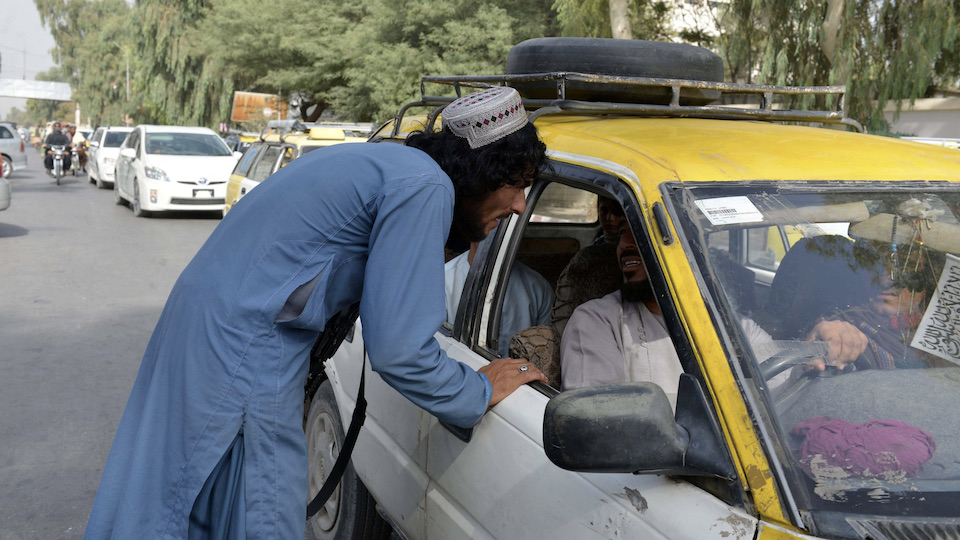Amnesty: Taliban dismantle human rights

Targeted human rights violations by the radical Islamic Taliban are taking place in Afghanistan. Amnesty International, the International Federation for Human Rights and the World Organization Against Torture have documented this in a new report. Among other things, they report the killing of civilians and the restriction of women’s rights and freedom of expression.
The Islamists have already shown “that they do not take the protection and respect of human rights seriously,” criticized Dinushika Dissanayake, Deputy Director for South Asia at Amnesty.
For the report, the organizations conducted interviews with journalists, human rights activists, a former government official and a researcher. They also analysed videos, photos, satellite images and media reports since the Taliban took power in mid-August.
Suppression of protests
In recent weeks, there have been repeated demonstrations against the Taliban in Afghanistan – also by women (in German). The Taliban have broken up some of these protests by force: peaceful demonstrators have been beaten, tear gas has been used and participants have been threatened with weapons. At the beginning of September, the Taliban had banned protests.
The organizations warn that the renewed attack on freedom of expression has just begun in Afghanistan. This right is guaranteed not only by the International Covenant on Civil and Political Rights, but also by the Afghan constitution.
Out of fear of the Taliban, many women now wear a burqa and no longer leave the house without a male escort. Amnesty criticizes the fact that no women are involved in the transitional government set up by the Taliban. This undermines women’s right to political participation. The organization also criticizes the fact that the Ministry of Women’s Affairs no longer exists – it had played an important role in improving women’s rights in recent years. Access to education for girls and women has already been restricted and women have been prevented from pursuing their work, it says. Many women had stopped working as a precaution.
The organizations also warn of the danger to LGBTQ people: Any person suspected of being in a same-sex relationship could face the death penalty.
The report also documents the killing of civilians by the Taliban. For example, a pregnant former policewoman was killed and singer Fawad Andarabi was shot dead. In the Panjshir Valley, at least 20 civilians were killed by the Taliban. The Taliban had also murdered the well-known comedian Nazar Mohammed back in late July. Aid deliveries to the embattled Panjshir Valley were blocked. Amnesty International condemns the killings and the blocked aid deliveries as a crime under international law.
It remains difficult or impossible for people in Afghanistan to leave the country, he said. Some have been tortured after trying to escape.
Human rights activists in danger
The organizations report that it is now almost impossible to campaign for human rights in Afghanistan: Attacks on human rights activists have increased since mid-August causing a “climate of fear.” There have been searches of homes and offices, forcing many activists into hiding. Threatening phone calls have also been reported. Human rights activists have also been beaten. Fear of further reprisals, however, meant that few were willing to publicly denounce the attacks, he said. “They live under the constant threat of arrest, torture or worse,” warned Delphine Reculeau of the World Organization Against Torture.
It is true that the Taliban had claimed to respect freedom of the press. However, the situation of media workers (in German) had also deteriorated further. Two female journalists, for example, reported to the organizations that the Taliban were looking for them. One of them had subsequently left the capital Kabul, the other the country.
Other female journalists were prevented from doing their work (in German). Media workers were arrested and beaten, particularly when they reported on protests. In connection with protests, the Taliban had ordered Internet blackouts in parts of Kabul and other parts of the country in August and September.
Dramatic human rights situation
The human rights situation in Afghanistan was already dramatic just a few weeks after the takeover, the organizations wrote in their report. Only a small number of incidents could be documented, as people did not report out of fear and there was no mobile phone reception in some provinces.
Amnesty International, the International Federation for Human Rights and the World Organization Against Torture call on the Taliban to respect and protect human rights. The UN Human Rights Council and the UN Security Council would have to monitor the situation and ensure compliance with human rights standards.
Julia Duchrow, Deputy Secretary General of Amnesty International in Germany, called on the German government (in German) to do “everything in its power” to provide protection in Germany for those at risk from the Taliban. The German government, he said, “must now quickly inform those affected of the 2,600 admission approvals agreed last week, support them in leaving Afghanistan, and ensure that the embassies of neighbouring countries proceed with visa procedures at full speed and that people can be evacuated from there. We call on the German government to continue to advocate for people targeted by the Taliban in the future, even beyond the admission approvals.” (js)